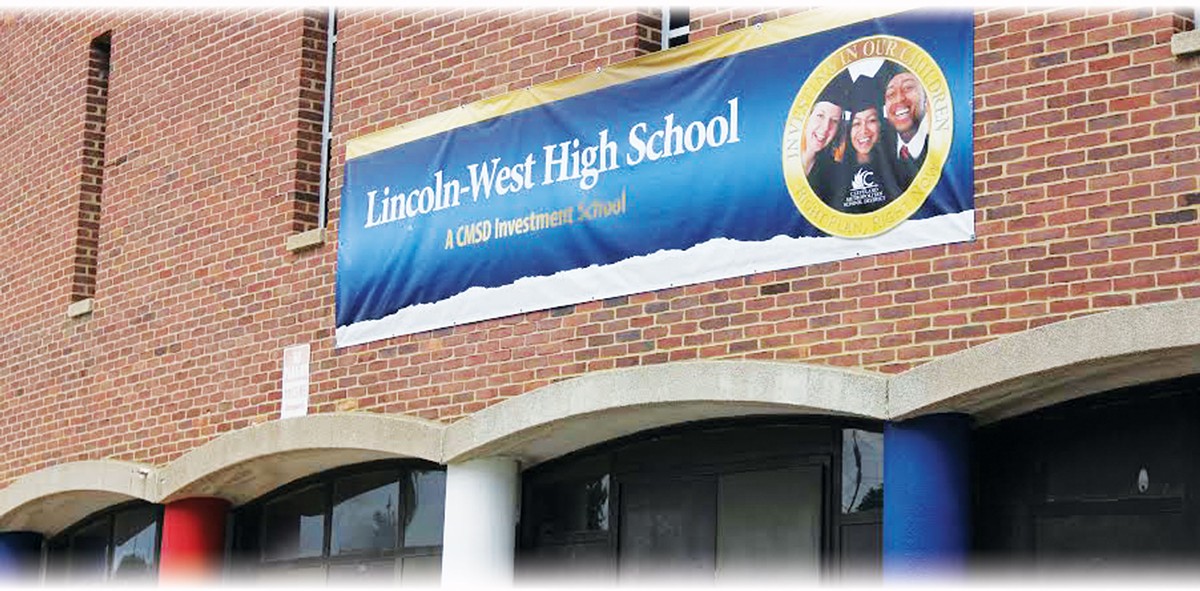When Catalina saw her cousin take a right hook to his eye in the cafeteria, it should have seemed out of the ordinary. It didn't. Falling into routine, she jumped into the scuffle and soon landed a suspension from Lincoln West High School. That wasn't unusual, either.
[Read this article in Spanish here - Lee el artículo en Español aquí]
She wrapped up 10th grade last month, but this particular fight broke in her freshman year, the spring of 2014. Catalina was one of 461 students suspended during the 2013-2014 year at Lincoln West (all told for 3,118 days, or seven days of missed school per student). Like most times she was sent home, she says she got very little work done. Classes passed her by.
Catalina didn't even want to fight that day, but family -- blood and otherwise -- is paramount in Puerto Rican culture. You back your family up.
"He had his eye swollen, his lip busted and everything," she says of the fight. Part of another gang dustup.
Catalina volleys between English and Spanish as she talks, sliding a pues... or a lo que into her conversations. Most of her friends straddle linguistic lines as well, though home life on Cleveland's westside is, for these students, more often than not conducted in Spanish.
As teachers surrounded the scuffle, Catalina and her cousin worked through a frantic blend of languages to explain what happened. Her cousin had been jumped, she told them.
No teacher really listened, or could, except for Elizabeth Ramos-Torres.
She was there, watching the fight. She'd find out soon enough that this was how things worked.
Ramos-Torres had been hired by Esperanza Inc. in March 2014 as the "bilingual site coordinator" for Lincoln West High School, which stands just south of Clark Avenue on West 30th. The hire, at $47,500 annually, was part of Cleveland Metropolitan School District's "Wrap-Around" partnership with United Way -- a grant-funded program that brings community leaders into CMSD schools to help them engage students in and out of the classroom. During her abrupt, six-month stint with the school, she grew angry with how the district was implementing the so-called Cleveland Plan for Transforming Our Schools and how the gap between students and administrators was widening. She says she saw injustices leveled in particular against the already-struggling Hispanic community.
"When I read about what the Wrap-Around program does, I really believed in it," Ramos-Torres told Scene shortly after she had been let go last fall. "We're supposed to go into the school and we're supposed to create programs to meet the needs of the students, the parents and the teachers. But we're more so concentrating on the students than anything else. I believed in that."
Her optimism slipped in short order. For Catalina and her family, the struggle had been a steady drone in their lives forever.
Catalina is not her real name. She tells Scene that the pressures and bullying from CMSD teachers and students are too much; publicizing her troubles would only guarantee more of the same. Seated at her family's kitchen table, her mother to her left and a friendly translator to her right, she says that long-standing problems at Lincoln West have yet to be fully addressed. Frankly, she's worn out from trying.
"My daughter has been through a lot of bullying," her mother, Juana (another pseudonym), says in Spanish. "They're bullying her because there's a language barrier and she can't express herself. There's no one to represent her."
What she means is this: a day-in, day-out routine of dismissal. "In 10th grade, I'm really having trouble," Catalina says. "I'll ask for help, and I'll ask the teacher, and they'll wait and wait and wait. I'll get frustrated and they'll just get mad at me."
That may sound like standard operating procedure for many students in need of tutoring or special attention, but Catalina says that her struggles with English comprehension -- she was taking ESL (English as a second language) this year and enjoying it -- present a disincentive for overworked teachers. With time, she slips further down the grade scale. Her test scores could be called abysmal.
As of the 2010 U.S. Census, Cleveland's Hispanic population was clocking in at 39,000. Anecdotal estimates peg an increase in the ensuing five years, particularly on the near westside -- clustered around the streets that shoot off West 25th south of Clark. Juana says her daughter's experiences in school mirror broader political marginalization outside CMSD's borders. Generally speaking, she's right. Teachers within the district concur privately, saying that the mostly Hispanic poverty decorating Clark-Fulton is an unavoidable factor in their education. The system is stacked against these students, and CMSD, try as it might, isn't ameliorating that. At least not in a comprehensive, public education way.
Lincoln West is a majority minority school. All told, 52 percent of students identify as Hispanic at the school, where 26 spoken languages represent 53 different nationalities, as of the beginning of the 2014-2015 school year. Total enrollment hovers around 850 or so, down from some 1,200 in 2013-2014. Students who are new to the U.S. -- emigrants from countries all over the world -- often take a year of schooling at nearby Thomas Jefferson International Newcomers Academy before funneling into the 45-year-old Lincoln West building as sophomores. Still, students and parents will say that this is an Hispanic school, through and through.
For Catalina, life, of course, revolves around school. With what energy she can summon, her goal is to skid across the destitution of poverty in Cleveland and graduate from high school. She wants to be a SWAT officer when she grows up. She knows she needs some improvement on those math scores.
To facilitate dreams for CMSD's thousands of students, the district began taking aim at its failing schools a few years ago. A central component of the Cleveland Plan for Transforming Our Schools is the identification of 23 "Investment Schools" -- schools that rank among the worst of the worst. The list includes Hispanic-heavy Lincoln West and Walton and Luis Munoz Marin elementary schools (also in Clark-Fulton), where westside Hispanic institution Esperanza Inc. employs site coordinators. These schools "fail to meet even minimum state standards," according to the Cleveland Plan, and they're far from the only ones with that label.
When voters approved the November 2012 $15-million levy, they did so under the promise of fixing the Ds and the Fs of the districtwide report card (Lincoln West being a prime example) to something resembling passing, something that would signal a foothold for, in the most utilitarian sense, the city's future workforce. The levy will likely be up for a renewal in late 2016
On many promised fronts already, though, the district has balked. For the already marginalized Hispanic population, saddled with a mountainous language barrier, teachers say the strategy isn't panning out. The district holds aloft a rising graduation rate -- across the board and for all represented races -- but parents and teachers seem well aware that many the neediest students are falling through widening cracks in the increasingly standardized system.
Back on March 6, 2014, CMSD CEO Eric Gordon announced the second round of Investment Schools, lauding the fledgling program and looking toward the future. He said things were really working this time.
"Investment Schools are a portion of our strategy," he said. "If we can take immediate, explicit corrective action, we can quickly get a changed culture that will lead to changed results...Cleveland as a district has been known for our single-year investments for many years. Start a strategy, stop a strategy. Start another strategy, stop another strategy -- a frenetic set of strategies applied randomly across our district."
Earlier this year, Gordon announced that he and the administration would be rewriting the strategy again. Even for students and teachers well equipped in their English, the turnabout is dizzying.












